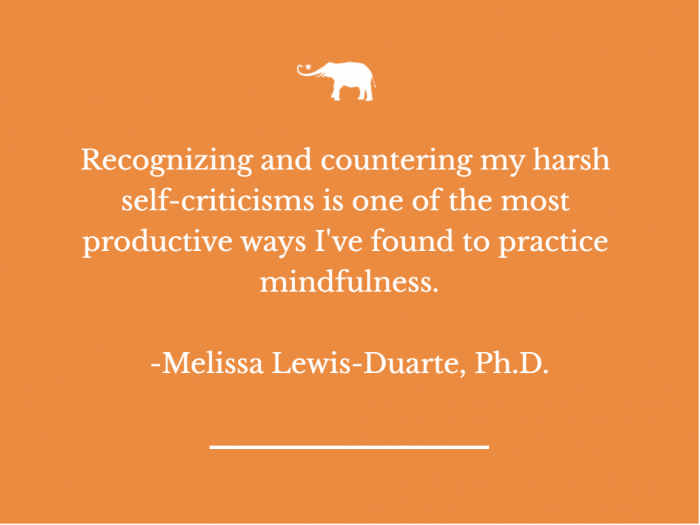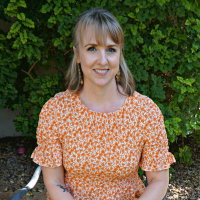View this post on Instagram
{Editor’s Note: This is an “Elephant Classic” article that we share year after year, even though it was written in 2021. In 2025, World Kindness Day is on Thursday, November 13th!}
World Kindness Day will be celebrated on Saturday, November 13th.
In celebration of the international holiday, let’s stop bullying ourselves and foster the most important relationship there is: the one we have with ourselves.
Mindfulness can be used to build awareness of our thoughts and replace self-criticism with self-compassion, resulting in more kindness.
Mindfulness motivation
In the beginning of the year, I was insanely anxious. I was tired of living a life in which I was constantly stuck in my head and unable to enjoy the present moment. Knowing I needed a mindset shift, I made what I called a “commitment to calm.”
I prioritized my self-care with a commitment to spend at least 10 minutes per day on mindfulness-based practices like yoga, meditation, and gratitude. I spent the past 10 months working on it, going to therapy, learning new habits, and doing research. I’m in the trenches, doing the work, and writing about it so others can share their journey with me.
My mindful personal growth, as it turns out, has been a two-step process. The first step was to become aware of the bad, a sometimes messy and difficult voyage into self-discovery and honesty. Next, my focus shifted to the good, replacing the ineffective thought-behavior patterns with better coping mechanisms.
When it comes to enhancing self-kindness, this means awareness first, self-compassion second.
Awareness of what doesn’t work: I can be an asshole
As mindfulness practice taught me to slow down, pause, and calm down, an interesting thing happened. I became aware of my thoughts. As my therapist once observed, “You have a really harsh inner mean girl.” Yes, my thoughts can be terrible! At times, it was appalling to shine a light on my inner dialogue, but I learned to acknowledge it as an important first step.
When I started this journey, I was aware of my tendency to want everything done perfectly, yesterday. But I wasn’t aware of how much pain I was causing myself. My impossibly high expectations and perfectionism, fueled by my worried and obsessive anxious mind, made me miserable on a number of occasions. I pushed myself, overcommitted, and obsessed about the to-do list to a point of causing my own burnout, stress, feelings of inadequacy, and temper tantrums.
I was being a real asshole to myself.
Before mindfulness, I followed negative thoughts with reactive behaviors. For example, I thought I was fat; I started a diet. I thought the blog wasn’t successful enough; I started a new task list to do more. I thought the kids were acting crazy; I started a new discipline chart. Anything that caused me discomfort was met with controlling behaviors. But it was never enough, and the inner critic always found something to rail against.
Mindfulness helped me bring these patterns into awareness and question their effectiveness. As with any change like this, it was both enlightening and difficult. It’s messy to reveal all the ways we are our own worst enemies. Plus, it takes some time to figure out what coping mechanisms are going to work better. Thus, it was important for me to not get discouraged during the awareness phase.
Eventually, I made the connection between my thoughts, behaviors, and well-being. I became curious about these automatic responses. Instead of believing the inner mean girl and launching into a behavior to shut her up, I learned to ask tough questions.
Considerations like, “That negative thought was perfectionism getting too loud again. Is that thought even true? Do I need to react? Is it necessary to try to control the situation? Can I let this unfold?” offered me alternative paths during negative thought spirals.
Awareness would buoy me long enough to pause, take a breath, and see the lack of kindness for what it was. In this regard, my mindfulness habits helped me increase my awareness skillset.
Replacing the bad with the good: squirming through self-compassion
When my therapist pointed out how mean I could be toward myself, she used it as an opportunity to encourage me to learn self-compassion. Despite my initial resistance, it proved successful in alleviating my anxious thoughts. Self-compassion made me uncomfortable at first, but it provided a foundation for building a kinder relationship with myself.
At the beginning of this journey, I was skeptical at the thought of being kind to myself. Although I desired a calmer life, I incorrectly assumed it was my stressful life that made things difficult and not my thoughts. Sure, I had a lot of heavy sh*t going on, but that will always be true for all of us.
I couldn’t control or change what happened, despite years of trying. However, I could control my response. I could learn to have a decent relationship with myself and my negative emotions.
This didn’t happen all at once. It’s not like I decided to be kind to myself, and my problems vanished. As with most lasting change, it started with baby steps. Initially, I learned to use self-compassion just when feeling anxious.
In the past, my anxiety would bring out my bully. I would try to rationalize with my anxiety and when that didn’t work, my anger escalated. My internal dialogue sounded something like, “No! Why am I anxious again? I’m so sick of this! This is so stupid. I shouldn’t feel this way!”
I started paying attention and only then was I able to choose a better response. Specifically, I realized when I was anxious and beating myself up (step one: awareness), and then paused and pivoted to kindness (step two: self-compassion).
This changed my response to something more like, “I’m feeling anxious. That’s normal for me and a reasonable response given the stress I’m under. I’m safe. Breathe. Life has been really stressful lately and I’m just doing the best I can. That anxious voice just wants to keep me safe. It’s misfiring, and that sucks. But I’ll feel better in a few minutes.”
If you’re like me (or how I used to be), this response felt a little touchy-feely. When my therapist encouraged me to hold my hand over my heart and say something comforting, it made me squirm. I’m sure I rolled my eyes at her and thought, “What? Are we going to sing kumbaya next?” But my anxiety was uncontrollable, and I was desperate to feel better.
To my surprise (but not hers!), it helped. To be clear, this wasn’t about lying to myself or engaging in toxic positivity. I wasn’t telling myself I was okay when I wasn’t. It was about getting honest about my thoughts and feelings and choosing my behaviors. It reflected a more caring approach to my anxiety, more indicative of how I would talk to a loved one.
It didn’t instantly resolve my anxiety, but it de-escalated it in a way that being frustrated and mean could not. It was a huge breakthrough for me. Once I became aware of how ineffective my usual thought patterns were (step one), I had no choice but to replace them with a better alternative (step two).
Over time, I’m getting better at silencing the inner asshole and turning to self-compassion. I can’t say it works every time or doesn’t still require effort, but mindfulness and self-compassion allowed me to build an undeniably better relationship with myself.
Mindfulness, awareness, and kindness
Recognizing and countering my harsh self-criticisms is one of the most productive ways I’ve found to practice mindfulness. Becoming aware of the pervasive and destructive nature of my thoughts was eye-opening. It provided an opportunity to practice acceptance without judgment. Simply allowing the thoughts to come and go, I now recognize that I don’t have to believe all of them.
Once I developed this mindfulness practice, I started countering the self-critic with self-compassion. This offered an opportunity to practice a kinder way of treating myself, talking less like a bully and more like a friend. Now, when my critical thoughts pop up, they serve as my signal to practice both mindfulness and self-compassion.
Here’s the best part: if I can learn to do this, so can you! With this framework, we can all use mindfulness to transform the relationship we have with ourselves. It can help to both increase our awareness of ineffective thought patterns and replace these patterns with self-compassion.
Join me Saturday on World Kindness Day. Commit to mindfulness and self-compassion practices. After all, it’s extremely difficult to have a healthy relationship with others if you don’t start with yourself first.


 Share on bsky
Share on bsky





Read 6 comments and reply